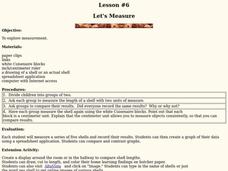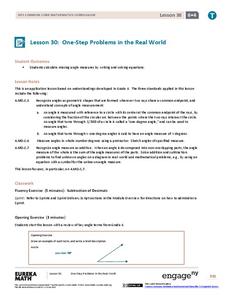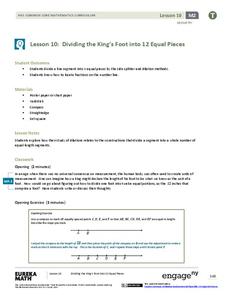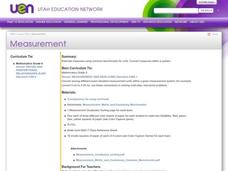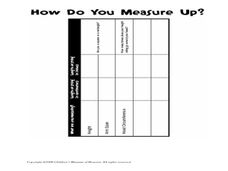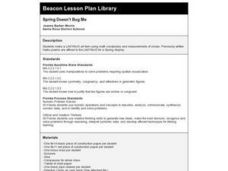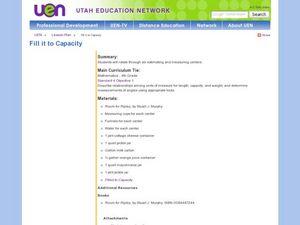Curated OER
Riding on a Pendulum
A comprehensive resource gets fourth grade physical scientists making observations about the period of a pendulum and then applying knowledge to a playground swing. Through seven different stations, they will record observations and...
Curated OER
Lady Liberty
If you're looking for a fantastic cross-curricular lesson on the Statue of Liberty, then this lesson is for you! Learners watch a Reading Rainbow episode which focuses on the Statue, then gather facts about the creation, construction,...
Curated OER
Let's Measure
Students measure shells using 3 different methods. In this measurement lesson, students work in two groups to measure the length of a shell using two different units of measure. The groups compare their results, measure the shell again...
EngageNY
One-Step Problems in the Real World
Mirror, mirror on the wall, which is the fairest resource of them all? Individuals write and solve one-step equations for problems about angle measurement, including those involving mirrors. Both mathematical and real-world problems are...
EngageNY
Dividing the King’s Foot into 12 Equal Pieces
Apply, apply, apply! A measurement lesson applies a number of concepts to help learn a new construction. Scholars learn to divide a segment into n equal parts using a method that uses the Side Splitter Theorem and a method that applies...
EngageNY
Percent Error Problems
Individuals measure a computer monitor and determine how accurate their measures are. The eighth segment in a series of 20 introduces the concept of percent error. Pupils find the percent error of their measurements and discuss the...
EngageNY
How Far Away Is the Moon?
Does the space shuttle have an odometer? Maybe, but all that is needed to determine the distance to the moon is a little geometry! The lesson asks scholars to sketch the relationship of the Earth and moon using shadows of an eclipse....
Baylor College
What's Is Soil Made Of?
It's time to roll up those sleeves and get a little dirty in the second instructional activity of this series on the science of food. Investigate where plants and animals get the minerals they need to live in this two-part exploration of...
Curated OER
Does it Measure Up?
Use this fun activity with youngsters learning how to use rules for measurement. Each is provided with six steps that direct them to draw specific things with specific heights or lengths. For example, they start by drawing a tree that is...
Curated OER
Measuring to the Nearest Foot
Second graders measure and record the length of five different objects around the room. They watch as the teacher measures items using a ruler. A ruler is a foot long. Everyone listens and watches as the teacher continues to teach that a...
Curated OER
Candy Bar Measurements
Geometers explore mathematics by completing an object measurement worksheet. They utilize a variety of candy bars and rulers to conduct a measurement experiment in class. They complete worksheets as a group based on the measurement...
Curated OER
Measurements: Inches
Children solve problems involving measurement using information taken from various items measured (wooden blocks and boxes). This is a particularly good instructional activity to use when introducing how to use a ruler and how to add...
Curated OER
Measurement
Students explore the concept of measurement. In this measurement instructional activity, students discuss what specific measurement tools such as an odometer measure. Students recite a measurement poem. Students make a foldable with...
Curated OER
Popcorn Math
Everyone loves popcorn! Use this treat to teach math concepts including place value, estimating, graphing, and volume. Eight possible activities are included, and they can be modified to fit all grade levels.
Curated OER
Measurement Masterpiece
Here is a good, cross-curricular measurement and estimation lesson. Learners practice measuring paper strips to create an art project. This is a great way to introduce the ruler, and how it used, to your students.
Curated OER
How Do You Measure Up?
Young scholars measure their body. In this measurement lesson, students use a string to measure their height and the circumference of their head. They record this information on the worksheet provided and answer questions as a group.
Curated OER
Spring Doesn't Bug Me
Pupils make a ladybug art item using math vocabulary and measurements of circles. Ladybugs are made using a compass. Once the bug is complete, attach a previously-written Haiku to it.
Curated OER
Measuring Activities
Students measure using both metric and standard measures. They convert from one standard to the next while measuring distances in their home or classroom.
Curated OER
Units Of Measure
Students investigate concepts relating the use of the metric system of measurement. They practice the skill of estimating units and especially which ones to use in certain problems for the most reasonable answer. The lesson includes...
Curated OER
Measurement (Grades 3-5)
Third, fourth, and fifth graders participate in measurement centers. They visit six different centers: standard and linear measurement, clocks, weight, volume, temperature, and converting measurements. They complete a data collection...
Power to Learn.com
Survey of Favorites
Upper grade and middle schoolers discuss their favorite TV programs, music, books, etc. Following a lesson on measures of central tendency, learners discuss random sampling. They conduct a survey and use charts and frequency tables to...
NTTI
Line 'Em Up!
Coordinate planes and Cartesian graphing systems are the focus of this math lesson. Learners use video, internet activities, and engage in hands-on activities in order to explore coordinate planes. The materials needed for this lesson...
Curated OER
Gotcha Covered, Pardner!
Young geometers use the interactive website Cyberchase to practice calculating both area and perimeter. Real world problems encourage learners to discover that we use math each and every day.
Education World
Teaching Students to Tell Time: Three Resources for Busy Teachers
Elementary schoolers develop time-telling skills, one skill at a time. They examine the connection between time on digital and analog (clock-face) clocks. An excellent lesson plan on teaching how to tell time!




